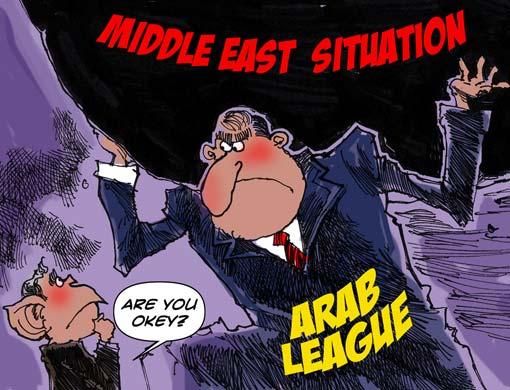The Arab League is conspicuous by its absence in seeking to take the political lead as the Arab world struggles with some of the largest challenges it has faced for decades.
The future of Iraq hangs in the balance as the Nouri Al Maliki government struggles to find new coalition partners; Iran continues to impose its renewed strength on the region, both in the nuclear sphere and in Iraq; and Palestine faces the horrors of a divided political leadership as Israel and the US administration prepare for President George W. Bush's autumn summit on the Middle East.
Not only is the Arab League silent, but there is little feeling across the region of any need for the Arab nations to plan how to take the political initiative on these issues. Individual countries are very active where they have special concerns, but as a group the Arab states seem to have run out of their collective energy.
Of course, it is hard for the Arab League to take the initiative on any of the issues such as Iraq, Iran, Darfur and others, where there is no formal Arab position, but that cannot be said about Palestine.
The Arab view has been long stated and is very clear: land for peace. This stand goes back for decades and might have become a ritual formula, but it was forcefully restated at the Beirut Summit in 2002 when the Arab nations adopted the plan from Saudi (then Crown Prince) King Abdullah, in which he cut through the years of additions and subtractions to the basic plan, with a simple restatement: If Israel withdraws from all land occupied after the Six Day War in 1967, all the Arab states will give Israel full recognition and full and open peace.
The key to the success of the renewed plan was the condition that all the land was to be returned (not a negotiated segment) for full peace including normal movement of people and goods, and open borders.
The Abdullah Plan is particularly important as the Bush autumn summit gets closer and the attendance of the Saudis is becoming a possibility.
The Arab states at this summit will be challenged to adopt all sorts of supportive positions to the United States' line on Iraq, and on Iran, but they should not vary from the Abdullah Plan when talking about Palestine.
It is a disaster for Palestine that its political leaders have split. The popularly elected Hamas has left the Palestinian government and taken over control of the Gaza Strip, and Fatah's Mahmoud Abbas is left with the presidency and control of the West Bank.
As a result of the split with Hamas, Abbas is in the disastrous position of relying on Israel to offer goodwill moves to increase his political strength.
However, at Bush's summit, Israel's Prime Minister Ehud Olmert and President of the Palestinian National Authority Mahmoud Abbas may share the same aims of making a firm declaration in favour of the two-state solution.
A strong commitment to recognising Israel and Palestine as valid and continuing nations due to share the land equitably, would be a major restatement of what has already been agreed, although by a previous generation of politicians.
Two-state solution
The two-state solution can be compatible with the Abdullah Plan, if the borders are made clear. Abbas along with other Arab leaders at the summit will need to spell out that the borders cannot be the borders that Israel has been seeking to create over decades through its land grabs and colonies on Occupied Territory, and more recently by building its infamous and illegal wall.
The Arab leaders have to be clear that only the borders that existed before 1967 are acceptable.
If the Bush summit gets such a declaration in place, then the harassed Abbas presidency has something that it can take to the Hamas politicians in Gaza, and will be able to ask them to reconsider their rejection of the present political process.
Bush, his Secretary of State Condoleezza Rice, and Olmert need to recognise that they will get nowhere without including Hamas. They cannot ignore the largest elected force in Palestinian politics, and whether Hamas is physically at the summit or not, its position has to be included in the discussions.
It would greatly strengthen Abbas' position at the summit if the Arab states made a united declaration before the summit, restating their support for the Abdullah Plan, and emphasised that the only way Israel will get complete peace with all the Arab world is through complete withdrawal.
If the Arab League does nothing else in the next few months, if it manages this it will have redeemed itself from its feeble present situation.










